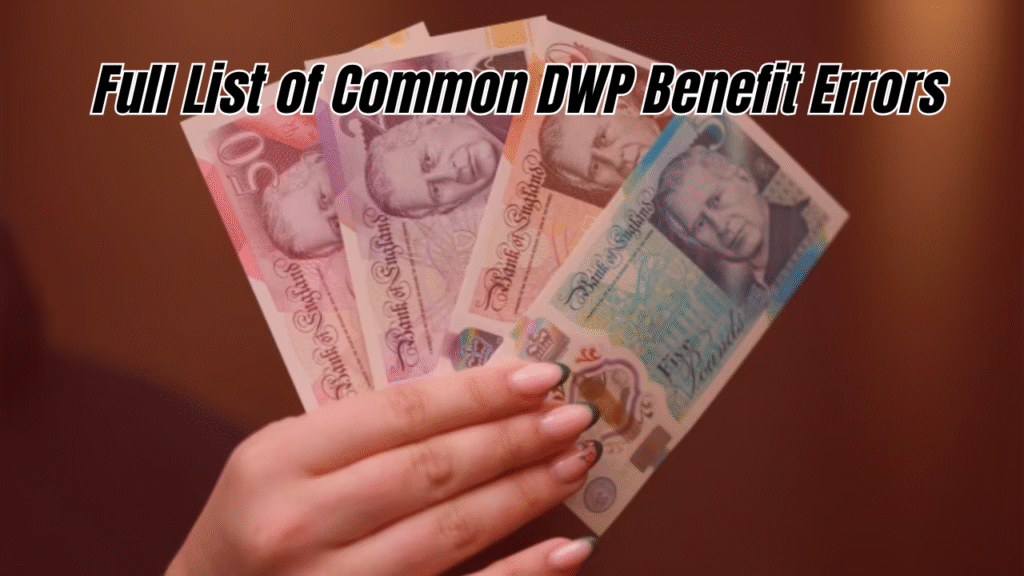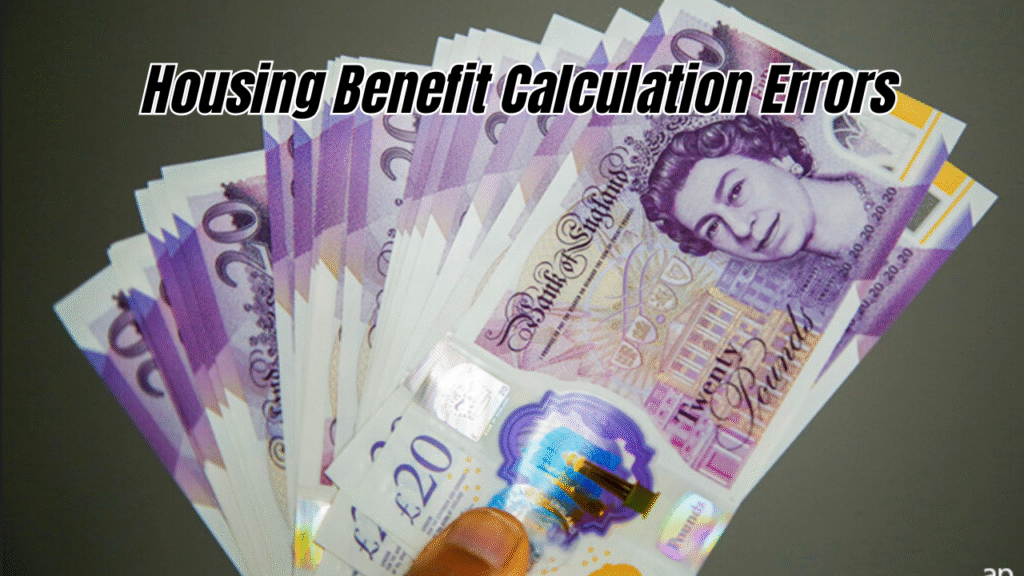Introduction
The Department for Work and Pensions (DWP) is responsible for overseeing a wide range of welfare benefits in the UK, including Universal Credit (UC), Personal Independence Payment (PIP), Employment and Support Allowance (ESA), and Pension Credit. Despite the critical role the DWP plays in the social safety net, its processes are not immune to errors.
These errors—whether caused by administrative issues, incorrect reporting by claimants, or flawed algorithms—can have serious financial implications. From underpayments to overpayments, unreported changes to wrong benefit calculations, thousands of people may unknowingly owe the DWP £1,000s, or miss out on money they rightfully deserve.
This article will walk you through the most common DWP benefit errors, their financial impact, how to detect them, and what to do if you’re affected. We’ll also provide a detailed table, a conclusion summarizing key actions, and five critical FAQs to help you navigate the system safely.
1. The Scope of DWP-Related Benefit Errors
How Common Are These Errors?
Over the years, DWP benefit errors have become a widespread issue. Whether due to:
- Human error
- Inaccurate IT systems
- Lack of claimant understanding
- Miscommunication
They can result in:
- Incorrect payments
- Demands for overpaid sums
- Court action or sanctions
- Severe financial distress
According to previous internal reports, billions of pounds may be mispaid annually, with both overpayments and underpayments affecting vulnerable households.
2. Categories of DWP Benefit Errors
A. Administrative Errors
These are mistakes made by DWP staff or systems.
- Entering incorrect data
- Miscalculating entitlement
- Overlooking key medical documents
- Delays in processing claims
B. Claimant-Related Errors
Often accidental, these result from misreporting or lack of clarity.
- Not reporting changes in circumstances
- Providing incorrect income details
- Assuming automatic updates between benefit systems
C. Systemic Errors
Flaws built into policies or IT systems.
- Software glitches miscalculating Universal Credit awards
- Flawed automation during legacy benefit migrations
D. Third-Party Errors
Errors made by landlords, employers, or healthcare professionals that impact DWP assessments.

3. Full List of Common DWP Benefit Errors
Below is a table summarizing the major known errors across various benefits:
| Benefit | Error Type | Impact | Possible Debt |
|---|---|---|---|
| Universal Credit | Inaccurate income reporting from RTI system | Overpayment | £2,000+ |
| PIP | Missed or misinterpreted medical evidence | Underpayment or rejection | £1,500+ |
| ESA | Not migrated correctly from IB/SDA | Underpayment | £5,000+ |
| Pension Credit | Excluded savings or undeclared income | Overpayment | £1,200+ |
| Housing Benefit | Rent change not updated | Over/underpayment | £500–£3,000 |
| Child Benefit | Not stopping at age 16+ if child leaves education | Overpayment | £1,000+ |
| Carer’s Allowance | Exceeding earnings threshold | Overpayment | £2,500+ |
| Disability Living Allowance | Not reporting medical improvement | Overpayment | £1,000+ |
| State Pension | Missed entitlements (especially women) | Underpayment | £8,000+ |
| Attendance Allowance | Form errors or vague descriptions | Refusal or lower award | N/A |
4. Universal Credit-Specific Errors
- Real-Time Information (RTI) Misalignment: Income wrongly reported from HMRC databases.
- Housing Element Mismatch: Claimant pays more rent than the DWP acknowledges.
- Childcare Costs Misreported: Not submitting receipts on time.
- Work Capability Assessment Delays: Delays in issuing Limited Capability for Work status.
5. Personal Independence Payment (PIP) Errors
PIP assessments are notoriously error-prone, especially due to:
- Incomplete medical assessments
- Overlooked symptoms or conditions
- Atos or Capita assessors’ misjudgment
Many successful appeals reveal that original decisions were incorrect, leading to months or years of underpaid support
6. ESA (Employment and Support Allowance) Migration Issues
Thousands of people who moved from Incapacity Benefit to ESA between 2011–2014 were wrongly excluded from income-related top-ups. The result?
- Many were owed £5,000+
- Some received backdated lump sums in later years
- Others remain unaware and unpaid
7. Pension Credit Underpayments
Elderly pensioners, especially women, are at risk of:
- Not claiming Pension Credit when eligible
- Misreporting small private pensions or savings
- DWP not factoring in spousal changes or bereavement

8. Housing Benefit Calculation Errors
Mistakes here often stem from:
- Delayed rent updates from councils
- Confusion over non-dependent deductions
- Overpayments due to cohabitation not being reported
9. Carer’s Allowance Pitfalls
Carer’s Allowance is simple in theory, but easy to miscalculate:
- You must earn below a certain weekly threshold (approx. £151/week)
- Many carers accidentally go over due to bonuses or overtime
- DWP may reclaim months of allowance
10. Disability Benefits Overlooked
For both DLA and Attendance Allowance:
- Vague or incorrectly completed forms
- Missing daily care or night-time supervision details
- Failure to report progressive conditions
Leads to inaccurate award levels or total denial.
11. What Happens If You Owe the DWP?
Debt Recovery Process:
- DWP sends notification letter (overpayment notice)
- Deductions begin from current benefits (up to 25%)
- In some cases, debt collection agencies may get involved
- Legal action if ignored
You can:
- Appeal the overpayment
- Request a mandatory reconsideration
- Claim ‘official error’ status to waive repayment
12. What If DWP Owes You Money?
If DWP made an underpayment, you’re entitled to:
- Backdated payments (up to 10 years in some cases)
- Interest in certain legal cases
- Reassessment of your current award
Always keep copies of:
- Decision letters
- Medical records
- Communication logs
13. How to Check for Errors
- Review your award notices
- Check for income accuracy
- Ensure child dependents are up to date
- Recheck medical reports
- Use benefits calculators to see if your amount is correct
- Ask a welfare advisor to audit your case
14. What to Do If You Spot an Error
- Gather Evidence: Print or download award letters, emails, payslips.
- Contact DWP: Call or use your Universal Credit journal.
- Submit a Mandatory Reconsideration.
- Escalate to Tribunal: If rejected, request an independent appeal.
- Seek Legal Help: Free help from Citizens Advice or Law Centres.
15. How to Prevent Future Errors
- Report changes promptly (income, housing, children, relationships)
- Keep all correspondence
- Use benefit calculators twice a year
- Double-check all submissions
- Get free help from advisors before applying
16. High-Risk Groups for DWP Errors
| Group | Risk |
|---|---|
| Elderly women | Missed pension credits |
| Carers | Overpayment via work earnings |
| Migrants | Residency checks and documentation |
| Self-employed | UC misreporting due to fluctuating income |
| Disabled people | PIP/ESA misassessments |
| Low-literacy claimants | Form errors |
17. What Not to Do
- Don’t ignore DWP letters
- Don’t repay immediately if you believe it’s an error
- Don’t assume a wrong award is final
- Never lie or omit details—this can be considered fraud
Conclusion
DWP errors—whether overpayments or underpayments—are more common than you think and can cost families thousands of pounds. The financial burden can be devastating, especially when reclaiming overpayments results in debt.
By staying informed, regularly checking your forms, and taking proactive steps, you can prevent, detect, and correct most DWP-related errors. If you believe you’ve been affected, act quickly and seek assistance from qualified advisors.
Remember: knowing your rights is the first step to protecting your benefits.
FAQs
1. What should I do if I receive a letter saying I owe DWP money?
Check the letter for details. If you believe it’s an error, request a mandatory reconsideration. Don’t ignore it—delays can lead to deductions or legal action.
2. Can I get a refund if DWP underpaid me in the past?
Yes. In many cases, DWP can issue backdated payments. Some rulings have seen refunds go back up to 10 years.
3. What if I made a mistake on my benefit form?
Report it immediately. If it was unintentional, DWP may reduce penalties. Honest mistakes are better addressed than ignored.
4. Is it true that I might owe thousands without knowing?
Yes. Some errors only appear after a review. If you’ve changed jobs, relationships, housing, or earnings, you could have built up a hidden overpayment.
5. Where can I get help to check my benefits?
Citizens Advice
Turn2Us
Local Council Welfare Rights Unit
Disability Rights UK
These organizations offer free benefit checks and appeal support.


